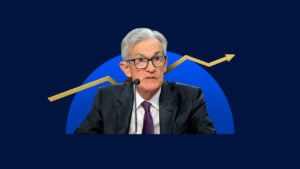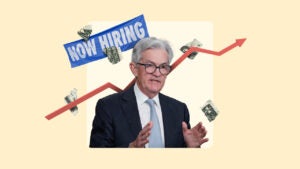How inflation affects the stock market

Maybe you’ve heard of inflation or felt it burning a hole in your wallet. Maybe you’ve also heard of the Federal Reserve, which works to keep inflation in check and sets monetary policies — such as interest rates — that ripple through the market. Wherever or however you’ve heard it explained, inflation and what comes with it (namely, higher interest rates and changes in consumer spending) can have huge effects on the stock market.
Here’s a look at how inflation affects investor sentiment, stock prices and sector performance.
What is inflation and what causes it?
Inflation is the sustained rise in average prices and it’s always been a consideration for investors, most recently in 2022 when inflation peaked at 9% — the largest increase since the 1980s.
There are a few different types of inflation but these two broad categorizations are common and both have been in play in recent years.
- Cost-push inflation happens when higher production costs increase overall prices in an economy.
- Demand-pull inflation happens when demand for goods and services outpaces the supply of those goods and services.
The Federal Reserve, the central bank of the U.S., plays a significant role in taming inflation through the use of monetary policy, usually by raising or lowering the federal funds rate, which is the rate that banks pay for overnight borrowing. This also influences the borrowing costs for households and businesses.
It’s important to note that central planning affects both demand-pull and cost-push inflation. Government deficit spending increases demand, potentially driving prices higher, while Federal Reserve policies such as lowering interest rates boost borrowing and spending. On the flip side, if central planning actions weaken the dollar, the cost of imports rises, fueling cost-push inflation.
In response to the most recent rise in prices, the Federal Reserve hiked interest rates throughout 2022 and into 2023 to decrease the willingness to spend and slow inflation.
4 ways inflation affects the stock market
Whether it’s demand-pull or cost-push inflation or a combination, inflation affects the stock market. For example, moderate to low inflation — when prices rise less than 3 percent — can signal healthy growth and more predictability. But higher inflation rates, typically above 3 percent, could increase volatility across the economy and stock market.
Inflation, especially at high levels, causes a chain reaction that reverberates through the stock market in four ways.
1. Inflation influences stock prices
High inflation can affect stock prices in different ways depending on the strength of the business. Even amid rising prices, some companies can still thrive because they’re able to absorb or pass on price increases to consumers, while some can’t. This makes some stocks a good long-term vehicle for hedging against inflation, even if their stock prices decline in the short term due to anxious investors.
Inflation that’s surging above the long-term trend puts companies in awkward positions because they must make the hard judgments when and how much to raise prices, or to try to hold the line on price, which weighs on profit margins. While consumers might prefer that companies avoid passing along higher costs through price, shareholders and employees will also suffer because firms have less flexibility and lower revenues and even profits.— Mark Hamrick, Bankrate Senior Economic Analyst
These struggles can impact company valuations across the stock market and cause stock prices and valuations to fluctuate. For years, it was widely believed that inflation coincided with weak economic growth and lower stock prices. But recently the stock market has seemed to reverse that trend.
Large-cap stocks generally have stronger pricing power thanks to their brand recognition and loyalty — meaning they can more easily pass on increases in cost to consumers without inhibiting demand — and are more likely to perform well. Small-cap stocks tend to have less financial leverage and pricing power.
2. Inflation impacts investor sentiment
Aside from the company fundamentals, another reason stock prices can fall in the short term is due to weak investor sentiment. Higher inflation means higher interest rates are incoming, which decreases stock valuations, irrespective of the profits and operational performance of a company.
All of these factors lead to uncertainty in the way investors feel toward stocks as they respond to changes in monetary policy.
Moderate inflation, however, is usually associated with higher investor confidence due to stable and predictable economic growth and prices. This type of economic environment encourages investors to be a bit more aggressive with assets that can offer higher returns, like holding onto stocks.
3. Inflation causes market volatility
The uncertainty around which companies can weather higher inflation and overall investor sentiment causes market volatility and unpredictability. Some investors attempt to foresee which businesses will be more successful amid high inflation and rotate between market sectors, selling off companies vulnerable to higher costs and moving toward those that are seen as inflation resistant — usually large-cap stocks and short-term bonds. This movement creates more frequent, and sometimes abrupt, changes in stock prices, causing the stock market to fluctuate.
As monetary policy shifts, investors also become more reactive to news surrounding interest rate hikes and company forecasts, exacerbating the volatility. Even minor changes in inflation data or central bank policies can cause market fluctuations.
4. Inflation affects broader sector performance
Inflation’s effects also aren’t uniform across stock market sectors.
- Real estate and energy sectors can more easily pass along price increases, because the goods they provide are considered a necessity.
- Precious metals, such as gold, often serve as an enduring hedge against inflation because they maintain value, meaning they don’t lose worth like cash does, and thereby help protect your money during tough economic times.
- Consumer discretionary sectors such as retail and autos have faced significant challenges in the past two years, particularly from reduced demand. Sectors such as manufacturing and transportation, which rely heavily on raw materials, also struggle to pass on costs to consumers without losing sales.
- Fixed income even becomes less favorable during high inflation, including long-dated bonds as inflation erodes the purchasing power of the fixed interest payments. When the Fed raises rates to fight inflation, prices of existing long-dated bonds fall, which makes them less attractive to investors compared to newer bonds with higher yields.
How to invest for inflation
While inflation has pulled back from its multi-decade highs, one thing remains clear: Companies that can pass along price increases and deal with higher costs have outperformed those that cannot. With rate cuts expected soon, certain investments may become more favorable, including small caps and long-term Treasury bonds. But maintaining a diversified portfolio is key.
In the long run, the businesses that are successful when inflation is higher may earn more even once prices stabilize, so owning some of these stocks (or funds that hold these stocks) helps to position your portfolio for current and future growth.
Bottom line
All in all, a little bit of inflation (about 2 percent) is considered healthy for economic growth, but too much inflation can spook investors and create market volatility. Inflation impacts stock prices and sector performance broadly, too, which causes investors to rethink their asset allocations and investment strategies, further spurring market volatility. The important thing to remember, though, is to think and invest with a long-term strategy in mind and maintain a diversified portfolio.
Editorial Disclaimer: All investors are advised to conduct their own independent research into investment strategies before making an investment decision. In addition, investors are advised that past investment product performance is no guarantee of future price appreciation.
Why we ask for feedback Your feedback helps us improve our content and services. It takes less than a minute to complete.
Your responses are anonymous and will only be used for improving our website.
You may also like

How a financial advisor can help you fight inflation

How does inflation impact bonds?




